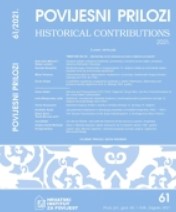O političkim aspektima proglašenja epidemije u okolici Velehrada u Moravskoj uoči proslave tisućite obljetnice smrti sv. Metoda 1885. godine
On the Political Aspects of Declaring an Epidemic in the Vicinity of Velehrad in Moravia on the Eve of the Celebration of the Thousandth Anniversary of St Methodius’s Death (1885)
Author(s): Zoran GrijakSubject(s): Christian Theology and Religion, History of Church(es), Local History / Microhistory, Government/Political systems, Health and medicine and law, 19th Century, Eastern Orthodoxy
Published by: Hrvatski institut za povijest
Keywords: Velehrad celebration of 1885; Sts Cyril and Methodius; abusing epidemics for political purposes; Austro-Hungarian Monarchy; Russian Empire; Triune Kingdom; Josip Juraj Strossmayer; Lujo Vojnović;
Summary/Abstract: The paper investigates the circumstances in which an epidemic was proclaimed in the vicinity of Velehrad in Moravia, on the eve of the celebration of the thousandth anniversary of the St Methodius’s death on July 5, 1885, as one of the earliest examples of abusing medicine for political purposes. The events related to the prevention of the Velehrad celebration in 1885 have been analyzed on the basis of correspondence between Bishop Josip Juraj Strossmayer and Franjo Rački, as well as between Lujo and Kosto Vojnović. The analysis focuses on the measure of restricting movement, passed by a consensual decision of the governments of the Austro-Hungarian Monarchy and the Russian Empire, which prevented the organized travel of Slavic pilgrims from other parts of the two empires to Moravia, although the epidemic actually did not occur. The prohibition was purely political in nature, intended to prevent mass religious gatherings of Roman Catholics and Greek Catholics from the Austro-Hungarian Monarchy and the Orthodox and Greek Catholics from the Russian Empire. The aim was to obstruct putting in practice the idea of church unification between the Catholic and Orthodox churches, strongly promoted by the Holy See during the pontificate of Leo XIII (1878-1903). The Austro-Hungarian government considered the idea of church unification as extremely dangerous and an instrument of pan-Slavic propaganda that encouraged the penetration of the Russian Empire into the Balkan and Mediterranean regions, threatening the existence of the Austro-Hungarian Monarchy. The Russian government also considered the idea of church unification to be highly dangerous, especially the affirmation of the Old Church Slavonic liturgy as the common church heritage of Catholic and Orthodox Slavs, which it perceived as an instrument of Catholic proselytism. In addition, in accordance with the position of the Russian Orthodox Church, Russia did not recognize Sts Cyril and Methodius as saints of the Catholic Church, but of the Orthodox Church alone. Affirmation of the Old Church Slavonic liturgy by the Holy See was also directly linked to its efforts to win over the Orthodox Churches in the Balkans for an ecclesiastical union, which Russia considered a potential threat to one of its most important foreign policy priorities, which was expanding its influence to the West. By accepting the ecclesiastical union with the Holy See, the Balkan Orthodox states would be far lesser subject to Russian political influence.
Journal: Povijesni prilozi
- Issue Year: 2021
- Issue No: 61
- Page Range: 91-139
- Page Count: 49
- Language: Croatian

